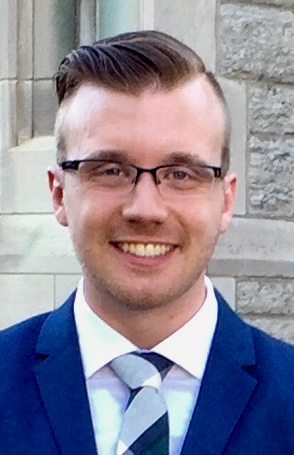Philip Meacham, (Biostatistics, MS 2013; Epidemiology, PhD Expected 2019)
Posted in Student Spotlight Student Stories | Tagged alumni, MS, students

Philip Meacham earned a Master’s of Science in Biostatistics in 2013 at Georgetown University. During his graduate studies at Georgetown, he worked at the National Institutes of Health as a research analyst with the National Institute of Child Health and Development. He also earned a dual Bachelor’s of Science in Statistics and Applied Mathematics, summa cum laude, from the Rochester Institute of Technology in 2011.
Philip began his doctoral studies in Epidemiology in 2013 at the University of Rochester School of Medicine and Dentistry. While pursuing a PhD, he also works as a research assistant in the clinical trials office at the Wilmot Cancer Institute. His research focus is in cancer epidemiology, and he is particularly interested in prevention of second cancers, risk prediction modeling, and applying novel statistical methodology in clinical and epidemiological research. His current doctoral research focuses on characterizing the population that develops multiple lymphoid malignancies during their lifetime and evaluating the risk of developing a second after surviving the first lymphoid malignancy.
Why were you interested in studying Biostatistics? What was your background before Georgetown University?
Before I started at Georgetown I got a dual BS in Statistics and Applied Mathematics. I wanted to continue my training as a statistician, but with a focus in the biomedical field.
What did you love most about the MS program?
I really enjoyed my time studying biostats at Georgetown, and I was very impressed with the variety of courses offered by the Department. It was helpful to have a mixture of both theoretical statistics along with practical courses. Having the exposure to many different applications of biostatistics not only taught me a lot, but it ensured that I was armed with a great toolbox that I could use in any field once I graduated.
What was challenging about the MS program?
The most challenging aspect of the MS program was continuously managing my time efficiently and balancing my workload, especially in the last semester. More specifically, the two primary challenges I faced were:
1) working over the summer at the NIH as a research analyst while working on my practicum project, as well as
2) finishing my practicum in the final semester of the program, working at the Lombardi Comprehensive Cancer Center as a data analyst, and continuing my course-load.
Despite these [challenging] experiences, I am very grateful for the skill sets that I developed as a result, and it benefits me now as I work as a research assistant while working on my PhD.?
What are you doing now? Please describe your current work.
I am currently a fifth-year PhD student in epidemiology at the University of Rochester and am planning on defending my dissertation next year [in 2019]. I am a cancer epidemiologist, with a specific interest in hematologic malignancies. My current research focuses on better understanding the risk of developing multiple lymphomas over a person’s lifetime.
How do you use what you learned in our MS program in your current work?
My first introduction to epidemiology – ever – was at Georgetown. If it was not because of the epidemiology course I took as part of the MS program in biostats, I might not be pursuing a PhD in epidemiology now. All of the other courses I took significantly helped me better understand statistics and become proficient at data analysis, which are two integral factors in being a good epidemiologist.
What advice would you give to current and prospective students?
I have two pieces of advice to current students. First, take full advantage of the resources offered by the Department, the Graduate School, and the University. These range from seminars and mentorship to study spaces and computer centers to writing centers and career development services. The second, and maybe most important, would be to enjoy your time at Georgetown; take full advantage of life and activities on campus.
Why did you want to continue with a PhD in Epidemiology? What do you hope to do afterwards?
While working on my MS in biostatistics, and after being introduced to epidemiology, I had a strong desire to further my epidemiological training with the eventual goal of becoming an independent researcher. I do not want to simply consult on research, or be the assigned statistician, but rather I want to be the one designing and conducting the research. A PhD in epidemiology was the logical next step; I do not consider it ignoring my training as a biostatistician but rather using those skills to be a better epidemiologist. When I began the MS program at Georgetown, my career goal after graduating was to work as a data scientist for either the Census, the NIH, or the CDC. I still desire to work in the government, but now in the capacity of an epidemiologist. I want to use my quantitative and computational skill set to serve my country in some capacity as well as advance scientific knowledge as it pertains to evidence-based medicine.
What is your favorite hobby?
I love antiquing.
Any interesting information or updates you’d want to share with us?
It would be very difficult for me to get through my PhD program without the love and support of my partner, Eddie Sundquist. We support each other in our careers and ambitions. He is currently running for US Congress in New York’s 23rd Congressional District, and I am proud to say that I am his biggest supporter.
Please consider learning more about Eddie and his campaign at eddiesundquist.com ?
Updated March 2018
